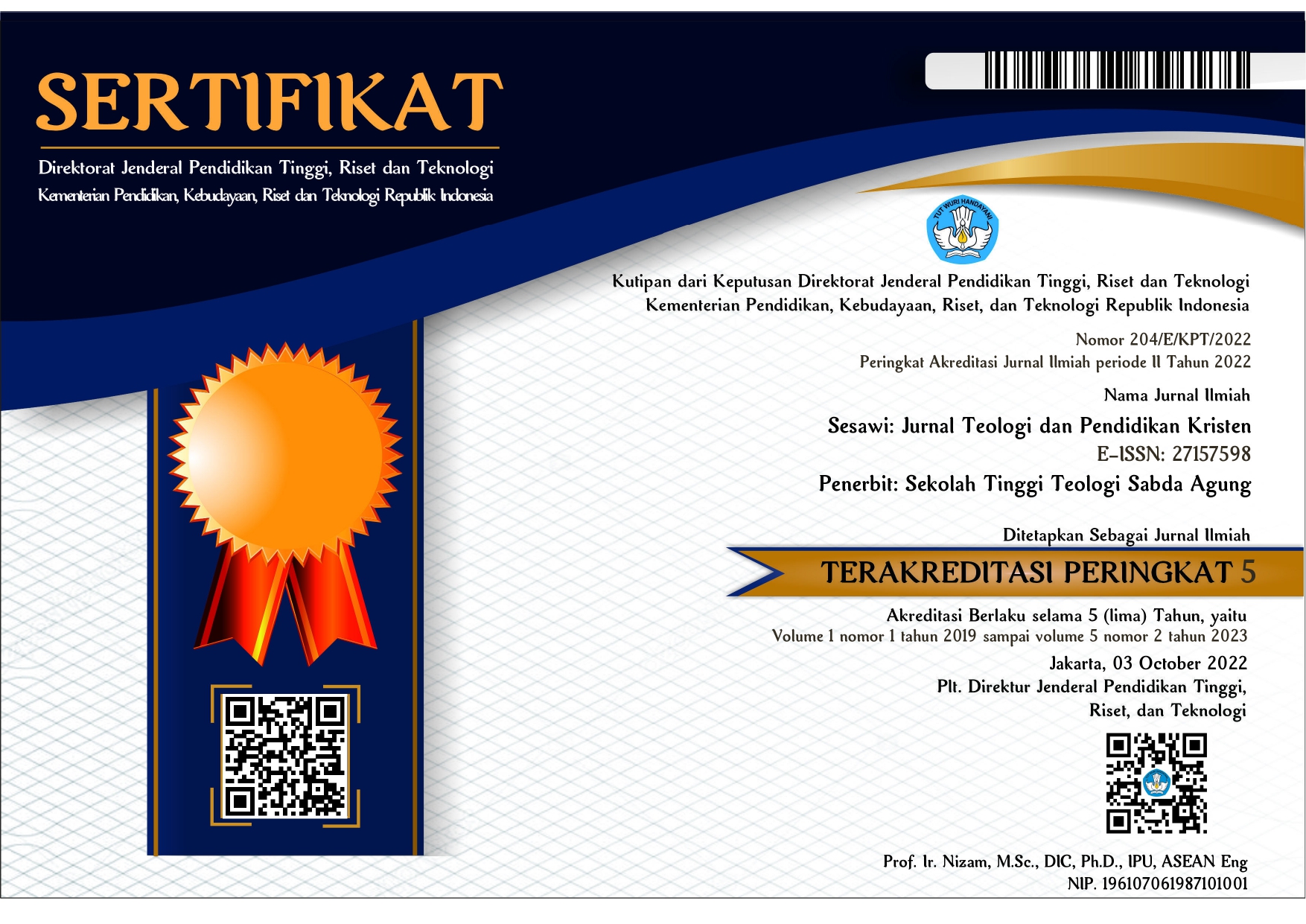PENYESALAN ILAHI: KAJIAN EKSEGETIS TERHADAP KEJADIAN 6:6
Abstract
Konsep “penyesalan Ilahi” dalam Kejadian 6:6 telah lama menjadi bahan perdebatan dalam teologi karena tampaknya bertentangan dengan sifat Allah yang Mahatahu dan tidak berubah. Latar belakang kajian ini berangkat dari pentingnya memahami bagaimana teks-teks Alkitab menggambarkan respons emosional Allah terhadap tindakan manusia. Penelitian ini bertujuan untuk mengeksplorasi makna istilah Ibrani nacham dalam konteks Kejadian 6:6 serta mengevaluasi implikasi teologisnya. Pendekatan yang digunakan adalah eksegetis tekstual dengan metode analisis tematik, linguistik, historis, sastra, teologis, dan budaya. Hasil penelitian menunjukkan bahwa penyesalan Ilahi bukanlah perubahan dalam hakikat Allah, melainkan ekspresi dari relasi yang dinamis antara Allah dan manusia. Allah menunjukkan kepedulian moral yang mendalam terhadap ciptaan-Nya tanpa mengubah esensi kekal-Nya. Kajian ini memperkaya pemahaman tentang karakter Allah dalam Perjanjian Lama dan menegaskan pentingnya membaca teks secara kontekstual dan intertekstual dalam studi teologi.
Full Text:
PDFReferences
Ankers, Paul, and Ross Brennan. “Managerial Relevance in Academic Research: An Exploratory Study.” Marketing Intelligence & Planning 20, no. 1 (2002): 15–21.
Balel, Y. “The Role of Artificial Intelligence in Academic Paper Writing and Its Potential as a Co-Author: Letter to the Editor.” European journal of therapeutics (2023).
Bammel, Jens. “The Publisher - Author Relationship Principles of Good Practice in Scholarly Journal Publishing.” Learned Publishing 12, no. 2 (1999): 75–78.
Banda, Collium. “God as a Servant of Magic? The Challenge of the Impersonalisation of God in Neo-Pentecostal Prophetic Responses to Human Agency and Transcendence in Africa.” Religions 13, no. 10 (2022): 975. https://www.mdpi.com/2077-1444/13/10/975/pdf?version=1666002134.
Baskoro, Paulus Kunto. “Pandangan Teologi Tentang Teologi Reformasi Dan Aplikasinya Bagi Kekristenan Masa Kini” 2, no. 1 (2021): 151–167.
Beck, James R. “Emotion as an Integrative Topic: An Analysis of Faithful Feelings.” Journal of Psychology and Theology 36, no. 1 (2008): 53–57.
Benjamin, Marina. “‘There Is No “Away:”’ Ecological Fact as Jewish Theological Problem.” Religions 13, no. 4 (2022): 290. https://www.mdpi.com/2077-1444/13/4/290/pdf?version=1648691952.
Bergh, Ronald Henry Van der. “The Distinction between Story and Discourse in the Analysis of Biblical Narrative.” Journal of Northwest Semitic Languages 34, no. 2 (2008): 83–98.
Berkhof, Louis. Teologi Sistematika: Doktrin Allah. Surabaya: Momentum, 2010.
Caragounis, Chrys C. “What Did Paul Mean? The Debate on 1 Cor 7,1-7.” Ephemerides Theologicae Lovanienses 82, no. 1 (2006): 189–199.
Casey, John Francis. “Beliefs, Commitments, and Ad Baculum Arguments.” Languages 7, no. 2 (2022): 107. https://www.mdpi.com/2226-471X/7/2/107/pdf?version=1651050773.
Chamberlain, William Douglas. “The Meaning of Repentance” (2012).
Chatterjee, Sutirtha, and Robert M Davison. “The Need for Compelling Problematisation in Research: The Prevalence of the Gap‐spotting Approach and Its Limitations.” Information Systems Journal 31, no. 2 (2021): 227–230. https://onlinelibrary.wiley.com/doi/pdf/10.1111/isj.12316.
Choo, Frederick. “Conversational Implicatures Cannot Save Divine Command Theory from the Counterpossible Terrible Commands Objection.” Religious Studies (2022): 1–7.
Churchill, John Ross. “Determinism and Divine Blame.” Faith and Philosophy 34, no. 4 (2017): 425–448. https://place.asburyseminary.edu/cgi/viewcontent.cgi?article=2299&context=faithandphilosophy.
Cook, Eleanor. “Ambiguity and the Poets.” Connotations: A Journal for Critical Debate 18 (2008): 230.
Dailey, Thomas F. “The Repentant Job: A Ricoeurian Icon for Biblical Theology” (1994).
Davison, Robert M. “Editorial: The Limitations of Limitations.” Information Systems Journal 27, no. 6 (2017): 695–697. https://onlinelibrary.wiley.com/doi/pdf/10.1111/isj.12167.
Erickson, Millard J. Teologi Kristen. Malang: Gandum Mas, 1999.
Esron Mangatar Siregar. “Prinsip Pelaksanaan Puasa Menurut Yoel 2:12-17 Bagi Kekristenan Masa Kini.” Manna Rafflesia 8, no. 2 (2022): 468–469.
Eveson, Philip. The Book of Origins. England: Evangelical Press, 2009.
Fleenor, Robert Paul. “Extreme Fate as Convention : Episodic Reprisals against Divine Messenger Opposition in Scripture” (2019). https://place.asburyseminary.edu/cgi/viewcontent.cgi?article=2445&context=ecommonsatsdissertations.
Frame, John M. Apologetika Bagi Kemuliaan Allah. Surabaya: Momentum, 2009.
Gitay, Yehoshua. “Literary Criticism versus Public Criticism : Further Thoughts on the Matter of Biblical Scholarship.” Old Testament essays 19, no. 2 (2006): 633–649.
Good, Marie, Michael Inzlicht, and Michael J Larson. “God Will Forgive: Reflecting on God’s Love Decreases Neurophysiological Responses to Errors.” Social Cognitive and Affective Neuroscience 10, no. 3 (2015): 357–363. https://www.demenzemedicinagenerale.net/images/isola/God_will_forgive.pdf.
Herdt, Jennifer A. “The Rise of Sympathy and the Question of Divine Suffering.” Journal of Religious Ethics 29, no. 3 (2001): 367–399.
Hermanto, Bambang Wiku. “Kajian Dan Uraian Apologetis Teologis Terhadap Ungkapan ‘Allah Menyesal’ Dalam Alkitab.” Jurnal Teologi Injili dan Pembinaan Warga Jemaat 1, no. 1 (2017): 33.
Hirst, Aggie. “Violence, Self-Authorship and the ‘Death of God’: The ‘Traps’ of the Messianic and the Tragic.” Millennium: Journal of International Studies 42, no. 1 (2013): 135–154.
Howell, David B. “Screening the Temptation: Interpretation and Indeterminacy in Cinematic Transformations of a Gospel Story.” Journal of Religion and Film 11, no. 2 (2007): 3. https://digitalcommons.unomaha.edu/cgi/viewcontent.cgi?article=1574&context=jrf.
Hura, Orianto, Martina Novalina, and Anwar Three Millenium Waruwu. “Pertobatan Sebagai Sebuah Bentuk Persiapan Menghadapi Akhir Zaman Dalam Matius 24:1-14.” Harvester: Jurnal Teologi dan Kepemimpinan Kristen 8, no. 1 (2023): 19–33.
Julio Avner Oktavianus Faot &, Anon Dwi Saputra. “Makna Pernyataan עַל־זֹאת נִחַ ם יְ הוָהנִ (NiHam Yhwh)(Ädönäy)(Al-Zöt) Dalam Amos 7:3 Dan 6.” KAPATA: Jurnal Teologi dan Pendidikan Kristen 2, no. 1 (2021): 72–73.
Khoury, Andrew C. “Forgiveness, Repentance, and Diachronic Blameworthiness.” Journal of the American Philosophical Association 8, no. 4 (2022): 700–720. https://www.cambridge.org/core/services/aop-cambridge-core/content/view/D92A15A52F32200238F5E03174BBC9C8/S2053447721000415a.pdf/div-class-title-forgiveness-repentance-and-diachronic-blameworthiness-div.pdf.
Knoper, Randall. “American Declarations: Rebellion and Repentance in American Cultural History.” College Literature 27, no. 3 (2000): 159.
Kosheleva, Olga, and Vladik Kreinovich. “Contradictions Do Not Necessarily Make a Theory Inconsistent.” Journal of Information Technology Education 4 (2017): 59–64. https://scholarworks.utep.edu/cgi/viewcontent.cgi?article=2122&context=cs_techrep.
Kuyper, Lester J. “The Repentance of God” 18, no. 4 (1956): 30–44. https://repository.westernsem.edu/pkp/index.php/rr/article/download/45/50.
Ladini, Riccardo, and Cristiano Vezzoni. “When Believing in Divine Immanence Explains Vaccine Hesitancy: A Matter of Conspiracy Beliefs?” Politics and Governance 10, no. 4 (2022). https://www.cogitatiopress.com/politicsandgovernance/article/download/5766/5766.
Lasine, Stuart. “Indeterminacy and the Bible: A Review of Literary and Anthropological Theories and Their Application to Biblical Texts” (2016). https://www.jstor.org/stable/27908973.
Lim, Jason Miin-Hwa. “Paving the Way for Research Findings: Writers’ Rhetorical Choices in Education and Applied Linguistics.” Discourse Studies 13, no. 6 (2011): 725–749.
Martin, Jerry L. “Introduction to the Topical Issue ‘Is Transreligious Theology Possible?’” Open Theology 2, no. 1 (2016).
Matheson, Benjamin. “Fame and Redemption: On the Moral Dangers of Celebrity Apologies.” Journal of Social Philosophy (2023). https://onlinelibrary.wiley.com/doi/pdfdirect/10.1111/josp.12510.
Mena, Alejandro Serrano. “Towards a Psychology of Divine Forgiveness: 2. Initial Component Analysis” (2022).
Nelson, Bryn. “When Medicine and Religion Do Not Mix: Overlooking or Misunderstanding the Religious and Spiritual Beliefs of Patients Can Present Significant Obstacles to Cancer Care.” Cancer Cytopathology 125, no. 11 (2017): 813–814. https://acsjournals.onlinelibrary.wiley.com/doi/pdf/10.1002/cncy.21943.
Niehaus, Jeff. Amos an Exegetical & Expository Commentary the Minor Prophets. Michigan: Baker Book House, 2000.
Peniel, Maiaweng. “'Utuslah Aku’: Eksposisi Yunus Pasal 3-4 Tentang Pengutusan Nabi Yunus Berdasarkan Perspektif Allah Menyesal.” Jurnal Jaffray 10, no. 2 (2012): 22.
Potter, Polyxeni. “And the Raven, Never Flitting, Still Is Sitting, Still Is Sitting1.” Emerging Infectious Diseases 16, no. 10 (2010): 1655–1656.
Prentice, Andrew M, Mathilde Savy, Momodou K Darboe, and Sophie E Moore. “Commentary: Challenging Public Health Orthodoxies—Prophesy or Heresy?” International Journal of Epidemiology 38, no. 2 (2009): 591–593.
Raczka, Roman. “Towards a Psychology of Divine Forgiveness” (2022).
Rev, Isaac Boaheng. “A Linguistic and Theological Assessment of the Gap Theory with Particular Reference to Genesis 1:1-2b” (2020): 1–10. https://noyam.org/wp-content/uploads/2020/04/EHASS105201.pdf.
Ross, Paula T, and Nikki L Bibler Zaidi. “Limited by Our Limitations.” Perspectives on medical education 8, no. 4 (2019): 261–264. https://link.springer.com/content/pdf/10.1007%2Fs40037-019-00530-x.pdf.
Silaeva, Zoya V. “Theological Analysis of the Religious Conflict: New Opportunities and Limitations” 11, no. 2 (2018): 350–358. https://www.minbar.su/jour/article/viewFile/408/404.
Sonnet, Jean-Pierre. “God’s Repentance And ‘False Starts’ In Biblical History (Genesis 6–9; Exodus 32–34; 1 Samuel 15 And 2 Samuel 7)” (2010): 469–494.
Spendlove, Loren Blake, and Tina Spendlove. “Turning to the Lord With the Whole Heart: The Doctrine of Repentance in the Bible and the Book of Mormon” (2016).
Swen, Blaine Anthony. “The Logic of Divine-Human Reconciliation: A Critical Analysis of Penal Substitution as an Explanatory Feature of Atonement” (2012). https://ecommons.luc.edu/cgi/viewcontent.cgi?article=1413&context=luc_diss.
Thesnaar, Christo. “Divine Discomfort: A Relational Encounter with Multi-Generational and Multi-Layered Trauma.” Religions 13, no. 3 (2022): 214. https://www.mdpi.com/2077-1444/13/3/214/pdf?version=1646224558.
Thiessen, Henry C. Teologi Sistematika. Malang: Gandum Mas, 1992.
Torrance, Alexis. “Repentance in Christian Late Antiquity, with Special Reference to Mark the Monk, Barsanuphius and John of Gaza, and John Climacus” (2010).
Walton, Heather. “Literature and Theology: New Interdisciplinary Spaces” (2013).
Weeks, Noel K. “The Ambiguity of Biblical Background.” Westminster Theological Journal 72, no. 2 (2010): 219–236.
Willis, John T. “The ‘Repentance’ of God in the Books of Samuel, Jeremiah, and Jonah.” Horizons in Biblical Theology 16, no. 1 (1994): 156–175.
Winn, Albert Curry. “Ain’t Gonna Study War No More: Biblical Ambiguity and the Abolition of War” (1993).
Wright, Christoper J. H. The Message of Jeremiah. Downers Grove, Illinois: InterVarsity Press, 2014.
Zeitlyn, David. “An Argument for Sparsity.” Journal of the Royal Anthropological Institute (2023). https://onlinelibrary.wiley.com/doi/pdfdirect/10.1111/1467-9655.13915.
Zheng, Yong. “Fill Students’ Knowledge Gap by Recommending Remedial Learning Materials” (2020): 217.
“2. Background: Tension, Ambiguity, and Discussion Surrounding a Verse.” Veröffentlichungen des Instituts für Europäische Geschichte Mainz (2023): 33–78. https://www.vr-elibrary.de/doi/reader/10.13109/9783666573507.33.
“The Authors Reply.” Critical Care Medicine 50, no. 4 (2022): e398–e399.
DOI: https://doi.org/10.53687/sjtpk.v6i2.283
Refbacks
- There are currently no refbacks.

This work is licensed under a Creative Commons Attribution-ShareAlike 4.0 International License.

SESAWI: Jurnal Teologi dan Pendidikan Kristen is licensed under a Creative Commons Attribution 4.0 International License.







